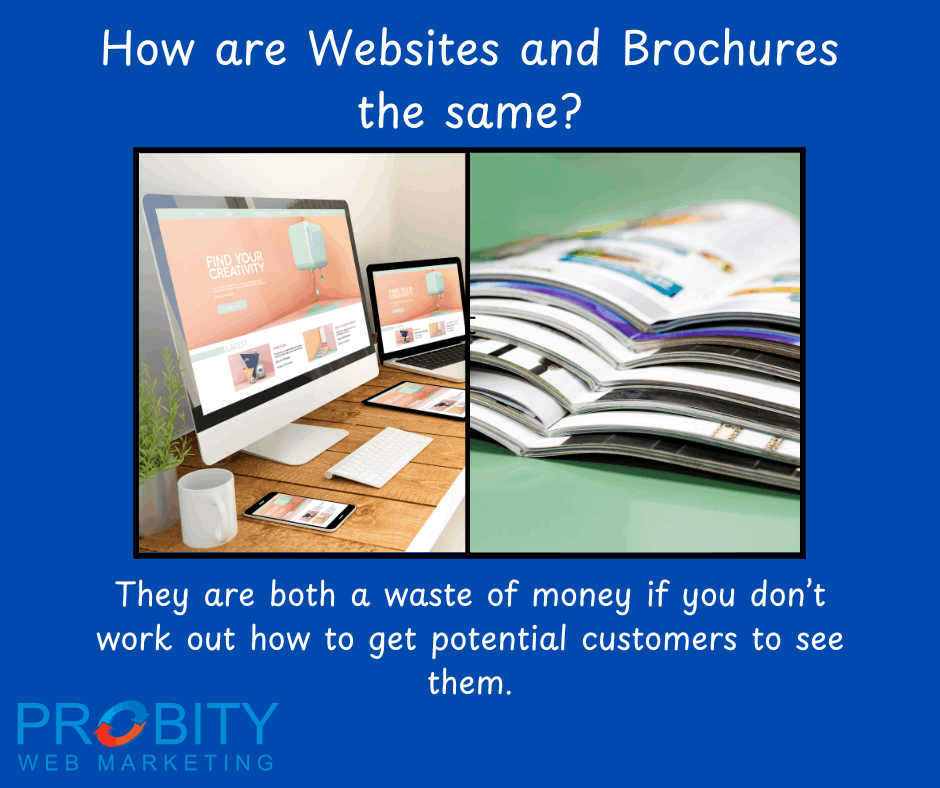Digital Marketing
Grow your Small Business with Online Marketing
Are you a small business owner?
Do you want to grow your business and know that to do this you need an effective digital marketing strategy?
Don’t know which digital marketing agency you can trust?
If you answered yes to these questions, then Probity Web Marketing is here to help. We are digital marketing specialists, helping small businesses grow their sales for over 17 years. In that time, we’ve seen it all, including many of our clients coming to us as a last chance after signing up with other digital marketing agencies that achieved nothing. We have also developed an overall digital marketing strategy that has proven success at growing our clients’ leads and sales from their website. We must be doing something right, as on average our clients have been with us for over 7 years, and we have grown their conversions from 6 to 161 per month.
Get in touch and ask us how we can grow your sales.
Or fill out the form below or give us a call on 1300 399 515 and we'll review your current DIGITAL MARKETING strategies.
What is Digital Marketing?
Digital Marketing is the marketing of goods and services using the internet and other digital channels. In other words, it is selling your products or services using websites, apps, mobile devices, search engines, social media and other digital means of communication.
Our Digital Marketing Strategy
We believe a good digital marketing strategy starts with a functional, professional website. Whilst some digital marketing companies may tell you that a website isn’t needed, and they can build you a strategy based off Facebook or Google Business Profile, this is definitely not a great strategy. The main issue is that you don’t control these platforms, and they can (and indeed have) make changes at any time that adversely affects your strategy. With a website, you are in complete control and make improvements etc as required.
After we’ve built you a great website, we can start to look at the different digital marketing channels to drive potential customers to your website to convert.
Your website and digital marketing
At Probity Web Marketing, we have been tweaking, testing and measuring our websites for over 17 years to develop the best possible website for our clients’ digital marketing. Over this time, we have used different website platforms and in the end decided to build our own purpose-built platform (SmartyrDXP) to ensure our websites tick all the boxes. So what are these boxes a high-performing website should have?
- Well structured to ensure Google fully understands what your products or services are so they rank well
- Professional, clean design
- Great UX design, allowing visitors to navigate easily to the relevant sections
- Clean code and design for fast loading
- Clear call to actions, so the visitor knows exactly what we want them to do.

Digital Marketing Channels
Having a great looking website with no other digital marketing is like having a great looking brochure sitting in your office. They are worthless unless you work out a way for possible customers to see them.
A great website is just the starting point for digital marketing; now we need to drive traffic (visitors) to it. This is where digital marketing channels come in. There are lots of different channels that can be used to bring visitors to your website or generate leads and sales directly, but the main channels we work with are:
Digital Marketing and SEO
Search Engine Optimisation is where you work to get your website found organically when someone searches for one of your products or services (or related searches) in Google, Bing etc. We strongly believe that all small businesses should have an SEO strategy as part of their overall digital marketing plan. It is a medium to long-term strategy.
Find out more about Search Engine Optimisation.
Content Marketing
During your research on digital marketing you may come across another channel called content marketing. This is developing content for your website and/or social media channels. However, we believe this is more a strategy for SEO and not a standalone channel. In fact, this is one of our main strategies for our proven SEO results.
Search Engine Marketing (SEM)
Search Engine Marketing is where you pay for your products and services to show up on the various search engines. The most common type of SEM is Adwords, which is Google’s version. There are 2 main types of SEM, these being “pay-per-click” where your ad shows at the top of the search page, and “display” where your ads show on various websites. There are many different ways you can set these up to show.
Find out more about Search Engine Marketing.
Social Media and Digital Marketing
Social Media is everywhere, so it makes sense to make sure your business is on them. However, many small businesses make the mistake of posting randomly on any social media platform they use personally. Firstly, these platforms may not be where your potential customers are, and secondly, this is great to build your presence on social media, but does it convert into sales for your business? Don’t be fooled by the “social media gurus” who focus on shares and likes, but not on the actual sales they generate.
Find out more about Social Media Marketing.
Email Marketing and Marketing Automation
Who said email is dead? Email is becoming more important as part of an overall digital marketing strategy. Whether it's sending out a monthly newsletter to your existing customers to re-engage them or triggering automatic emails (or SMS) when a prospect moves to a different stage of your sales process.
Our Digital Marketing Services
If it involves digital marketing, Probity Web Marketing aims to understand how it works and how to best implement it to help Small Business grow sales. We don't believe that all solutions work for all businesses and customise our solutions accordingly. Some of the solutions we do offer include:
- Website Design - content managed websites with a unique design.
- Search Engine Optimisation (SEO) - helping your website get found on Google, Bing etc.
- Website Optimisation (our key point of difference) - ensuring that you maximise the results from your website eg. more sales, more webform etc.
- Search Engine Marketing (SEM) - advertising your website using Google Adwords and Facebook Ads etc.
- Social Media Marketing - promoting your business through Social Media (Facebook, Twitter, Linked In, YouTube etc).
- Email Marketing - helping you build your database and market to it.
- Marketing Automation - setting up automatic emails and SMS to move prospects along the sales process.
- Domain Names - purchase and manage your Domain Names (don't pay $50 or more for a Domain Name).
- Website Management - help you keep your website up to date with current content.
Digital Marketing Case Studies
Probity Web Marketing has been helping small business owners grow their sales for over 17 years. During that time, we have worked with a wide range of businesses and have had great success, continually improving the digital marketing strategies we offer. On average our clients have been with us for over 7 years and we have grown their website leads by over 2500% from 6 to 161 per month.
Some of our Digital Marketing clients:
Read through the rest of our client case studies.
Digital Marketing Plan
Many digital marketing agencies can have convoluted plans where you pay for each element of the overall plan, leaving you confused and maybe reluctant to implement viable strategies. Our plans include most of the digital marketing services you will need to get great results.
View our digital marketing plans.
Need a Digital Marketing Specialist?
Have a look around our site to get an idea of what exactly digital Marketing is - our aim is to demystify it as much as possible. Or better still, contact our experienced digital marketing team and arrange an online meeting where we can discuss your requirements in full and explain some of the digital marketing strategies we feel would benefit you and your business.
Frequently Asked Questions about DIGITAL MARKETING
Glossary of Online Marketing Terms
Learn MoreWhat is a SERP?
SERP stands for "Search Engine Results Page". This is the page of results a search engine (eg. Google) shows you after doing a search.
I'm sure you've heard the term Marketing Automation. It's the new buzzword when it comes to digital marketing, much like SEO, Responsive Design and Remarketing before it. But do you know what it is and is it something you should consider for yo...
Learn More
The obvious answer is that your potential customers are all online, so shouldn't you be? Try and think of another marketing channel where all your potential customers are, I bet you can't. They're not all listening to commercial radio or watchi...
Learn MoreFor more in depth digital marketing information visit our Digital marketing Information page







